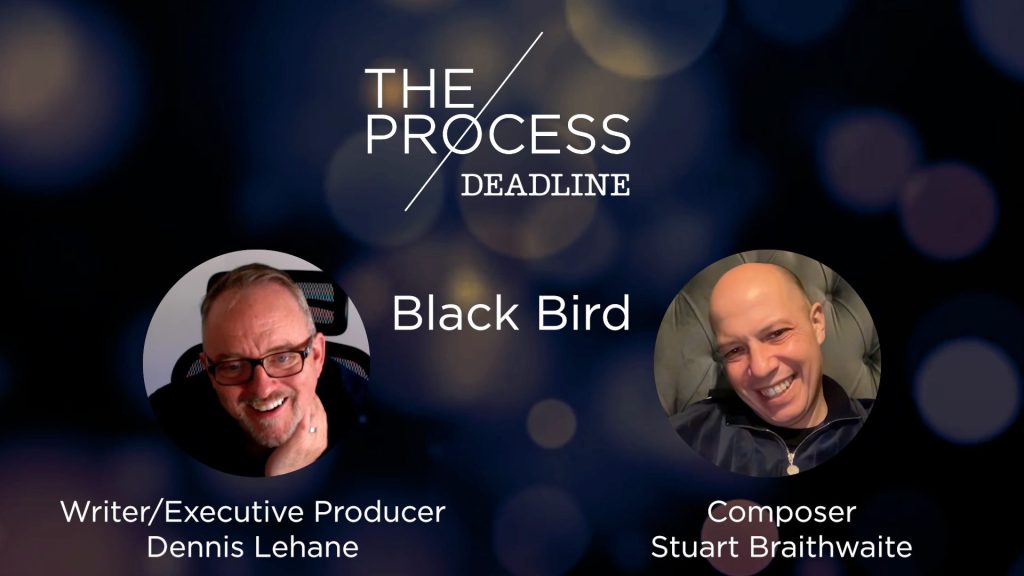
When Stuart Braithwaite was approached to score Apple TV+‘s crime drama Black Bird alongside the other members of his Scottish post-rock band Mogwai, his instinct was to seek a less than “obvious” way of approaching this true story, which was admittedly “insane,” tapping into its darkness while at the same time seeking other dimensions.
“I think this came from your guys’ side, as well,” Braithwaite recalls in conversation with Black Bird‘s showrunner Dennis Lehane in today’s episode of The Process. “Some of the really dark stuff, there would almost be a kind of lightness to the music, because we don’t need to be told that this is grim. We can see what’s happening, which I like.”
Displaying, in Braithwaite’s mind, “the full range” of Mogwai’s capabilities, the score for Black Bird would be heavily informed by bandmember Barry Burns and the “weird” sounds he’d bring out of a set of synthesizers, with the whole band playing on the title theme and numerous key sections.
“I think it kind of swings a lot from maximalism to minimalism, doesn’t it? I think a lot of it’s very, very subtle with gentle pianos or keys, and then a lot of it is a sort of simmering wall of noise, especially a lot in the prisons,” says Braithwaite. “[It’s] almost to match the stress going on in the whole situation. So, a lot of that is just incredibly loud and guitars and feedback, and hitting guitars with violin bows.”
Based on James Keenes’ autobiographical book In with the Devil: A Fallen Hero, a Serial Killer, and a Dangerous Bargain for Redemption, Black Bird watches as the former high school football hero, played by Taron Egerton, takes on an assignment for the FBI in order to cut short a sentence in minimum-security prison during the 1990s. His task? To enter a maximum-security prison and befriend the suspected serial killer Larry Hall (Paul Walter Hauser), such that he’s able to elicit a confession and find out where the bodies of his victims are buried.
When Braithwaite first discussed the series with Lehane, the renowned author of such novels adapted for the screen as Mystic River and Shutter Island, who has also worked on shows like The Outsider, he connected with the drive on Lehane’s part to tell this story without depicting Hall’s violent acts. “To take away any kind of titillation or even glorification of that was really important to you, and to honor the women, but also to examine how someone’s life can go so wrong and all these things,” says the composer. “I also really loved how humanized Larry’s portrayal was…I was talking to my wife about this earlier because we were watching it again…and we were just talking about…how important it is that people are seen as more than just one thing. Because the world isn’t black and white. There’s a lot of gray there.”
One of the biggest challenges for Mogwai in their work on the series, per Braithwaite, was just to “write music that equaled the quality of the show, of the acting and of the story.” The other was the perfecting of the show’s main title theme, which went through many iterations. “I always laugh about Oliver Stone’s Doors movie where they sat down and write ‘Light My Fire’ in 20 seconds. It was the exact opposite of that,” shares the artist. “Like, we busted our ass, tried that and tried that and tried that, and then we got there, and I’m really, really proud of how it turned out.”
In conversation with Lehane on The Process, Braithwaite discusses Mogwai’s “very freeform” creative process; how the band got into film scoring around 15 years ago after being approached for a doc on French soccer star Zinedine Zidane; having his sanity “saved during the [Covid] lockdown” by this kind of work, with touring suddenly an impossibility; learning to “work really fast” on the composing side, even if work with his band can be “really glacial” in pace; how Black Bird‘s main theme and its choral part for the daughter of bandmember Burns came about; the “really cool, conscientious, interesting people” he got to work with on the series; and the projects the band is taking on next.
Lehane speaks to connecting with Mogwai’s work via Michael Mann’s Miami Vice and his admiration of the group’s work on Prime Video’s globe-traversing crime drama ZeroZeroZero; Black Bird as a story “about a climb towards hope” that “keeps upping the ante” until “there’s no room to breathe”; the moment, listening to Black Bird‘s source material as an audiobook, that showed him the kind of “emotional impact” he would go for with the show; choosing “violence of the mind” over displays of physical brutality; the show’s examination of masculinity; Hauser’s dexterous work in capturing both the charm and monstrosity of Larry Hall; and more.
View the full conversation between Lehane and Braithwaite above.













